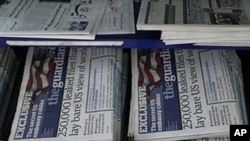A selection of more than 200,000 cables from U.S. embassies was released by WikiLeaks on Sunday. In them U.S. staff criticized a number of European leaders and it emerged that some diplomats have been tasked with finding out private information about global figures, blurring the lines between diplomacy and spying.
On Monday, Sweden's Foreign Minister Carl Bildt said the revelations will hurt international diplomacy. But, he said, the information that's surfaced is far from surprising. Here he is speaking on Radio Sweden.
"It is natural that one must know the policies and attitudes of the actors," he said. "I mean, if one delegate is known for being sort of say aggressive in his philosophy, it's important to know that or if it is one [that] one can talk to find solutions to difficult problems you must know who is the relevant actors. So it's a natural part of knowing whom you are dealing with."
The leaks show how the U.S. government has ordered its diplomats to gather information about global figures including their personal, biometric and banking details. Among the targets was United Nations Secretary-General Ban Ki-Moon.
John Kent, an international relations expert at the London School of Economics, says that revelation shouldn't hurt the relationship between European countries and the United States.
"I don't think in terms of the relationship between the EU and the US there will be that much significance, unlike for example in the Middle East because most people are aware, who know anything about what goes on with the EU and with the US that these things are done anyway. So it's not particularly revealing," said Kent.
In the secret messages, staff at U.S. embassies refer to French president Nicholas Sarkozy as "an emperor with no clothes"; German chancellor Angela Merkel is risk-averse and lacks creativity; Italian Prime Minister Silvio Berlusconi "feckless" and "vain". Kent says he thinks European leaders will take that news with a "wry smile".
But Michael Cox, co-director of IDEAS, a London-based center for the study of international relations, says what will hurt diplomacy is the fact that the cables have gone public. He says it might stop diplomats from being frank in the future.
The U.S., he says, should have done a better job of keeping the information private.
"If you want to keep a secret, you keep a secret. You don't tell anybody or you only tell a very, very small circle of people. If you don't want information to get out you just don't tell it two-and-a-half thousand people, particularly in an electronic age," said Cox.
The WikiLeaks revelations show how U.S. officials warned Germany against arresting CIA officers suspected of involvement in extraordinary rendition, where suspected foreign terrorists or criminals are sent to a third country for interrogation.
WikiLeaks Reaction in Europe Shows Dismay, Not Alarm




